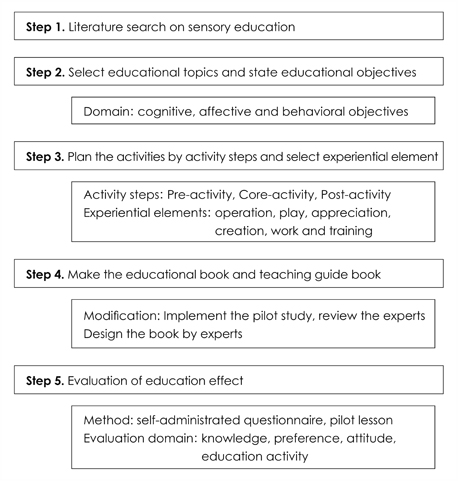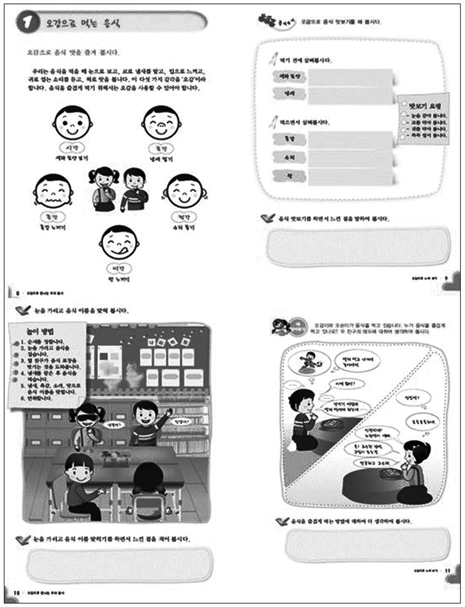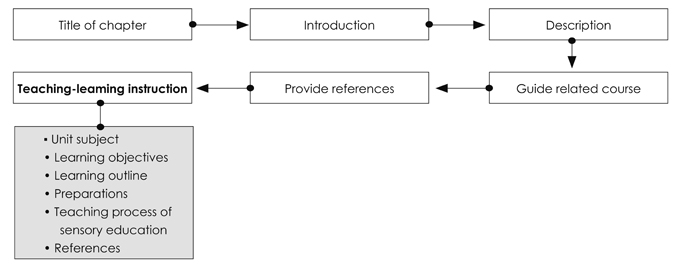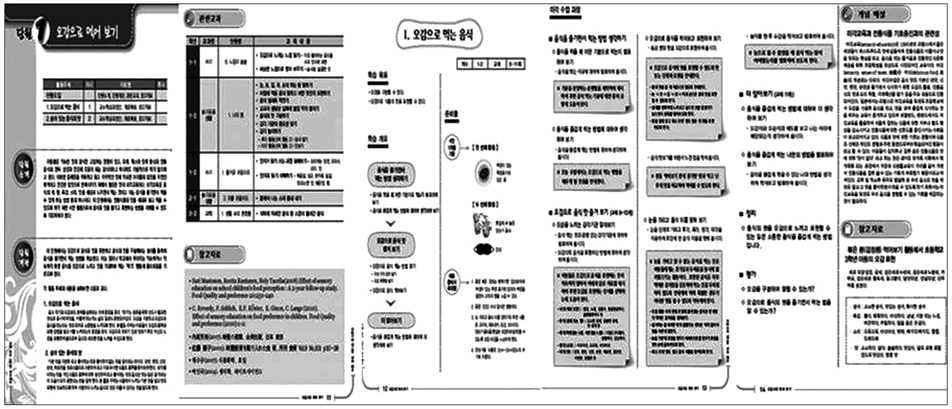Development of a Sensory Education Textbook and Teaching Guidebook for Preference Improvement toward Traditional Korean Foods in Schoolchildren
- Affiliations
-
- 1Department of Food and Nutrition, Changwon National University, Changwon 641-773, Korea. khl@changwon.ac.kr
- 2Ungnam Elementary School, Changwon 642-010, Korea.
- KMID: 2268546
- DOI: http://doi.org/10.4163/kjn.2011.44.4.303
Abstract
- The purpose of this study was to develop a textbook and teaching guidebook on sensory education for lower grade students at elementary schools. The goal of sensory education was to improve preferences for traditional Korean foods. An advisory committee was organized that was composed of 8 professionals in the education field, in order to discuss the adequacy and validity of the textbook's content. The textbook's units consisted of three parts composed of the following: 'feel by the five senses' (2 lessons), 'enjoying traditional Korean foods' (9 lessons), and 'eating together' (1 lesson). The lesson activities were based on experiential learning. The teacher's guidebook contained an overview of the education process, with specific information and practical guidelines for each lesson. Ninety-seven children in 3rd grade from one school participated in a pilot lesson, which evaluated the educational effects and satisfaction. After the lesson, the children had improved preferences for foods which were taught about in the class, along with better eating attitudes. These results reflect that the developed materials were suitable for improving children's preferences toward traditional Korean foods.
Figure
Cited by 5 articles
-
The development of a taste education program for preschoolers and evaluation of a program by parents and childcare personnel
Choengmin Shon, Young Park, Hyunjoo Ryou, Woori Na, Kyungsuk Choi
Nutr Res Pract. 2012;6(5):466-473. doi: 10.4162/nrp.2012.6.5.466.Effects of sensory education based on classroom activities for lower grade school children
Taejung Woo, Kyung-Hea Lee
Nutr Res Pract. 2013;7(4):336-341. doi: 10.4162/nrp.2013.7.4.336.Sensory education program development, application and its therapeutic effect in children
Mi-Hye Kim, Hae-Kyung Chung
Nutr Res Pract. 2014;8(1):112-119. doi: 10.4162/nrp.2014.8.1.112.The Development and Evaluation of a Nutrition Education Program including Sensory and Cooking Activity to Promote Vegetable Intake among School Aged Children
Hyun-ho Lee, Moon-kyung Shin, Hyunkyung Kim, Saebyeol Kwon, Se-young Oh, Hyojin An
Korean J Health Promot. 2019;19(1):49-58. doi: 10.15384/kjhp.2019.19.1.49.Study on the snack meal management for infants and toddlers and the demand for snack products according to the sustainable dietary style of mothers in Jeonbuk area
Ji-Eun Lee, Jeong-Ok Rho
J Nutr Health. 2020;53(1):39-53. doi: 10.4163/jnh.2020.53.1.39.
Reference
-
1. Park KY. Korean traditional foods and health. Proceedings for Alliance of Societies. 2001. 38–46.2. Kang JH, Lee KA. The perception, preference, and intake of Korean traditional foods of elementary school students-focusing on kimch, tteok and eumcheong varieties-. Korean J Food Cult. 2008. 23(5):543–555.3. Lee MY, Kim YA. The perception and utilization of Korean traditional food and fast food of elementary school children in Ansan area. J Korean Home Econ Assoc. 2006. 44(10):109–120.4. Cha JA, Yang IS, Lee SJ, Chang L. Effect-evaluation of Korean traditional food culture education program for the elementary schoolers. Korean J Food Cult. 2007. 22(4):383–392.5. Mustonen S, Rantanen R, Tuorila H. Effect of sensory education on school children's food perception: a 2-year follow-up study. Food Qual Prefer. 2009. 20(3):230–240.
Article6. Lee YB. Research of the recognition and preference of Korean traditional foods and Korean sauced foods by elementary school students in metropolitan area [Masters degree]. 2010. Anseong: Chung-Ang University.7. Gang MS, Chyun JH. A study on the perception and the knowledge of the Korean traditional food in the elementary schoolchildren of Incheon. Korean J Food Cult. 2006. 21(2):107–115.8. Uchisaka Y. Sensory education in class. 2007. Tokyo, Japan: Godo-Shuppan;64–73.9. Reverdy C, Schlich P, Köster EP, Ginon E, Lange C. Effect of sensory education on food preference in children. Food Qual Prefer. 2010. 21(7):794–804.10. Sato M. Introduction of sensory education in nutrition education. Monthly Nutr Edu. 2009. 9(101):10–28.11. Reverdy C, Chesnel F, Schlich P, Köster EP, Lange C. Effect of sensory education on willingness to taste novel food in children. Appetite. 2008. 51(1):156–165.
Article12. Mustonen S, Tuorila H. Sensory education decrease food neophobia score and encourages trying unfamiliar foods in 8-12-year-old children. Food Qual Prefer. 2010. 21(4):353–360.
Article13. Basic direction of Gyeongnam education for elementary education. Gyeongsangnam-do Office of Education. Available from: http://www.gne.go.kr/eng/basic/basic.jsp [2011 May].14. Choi IJ, Ryu CA. A study on design model of experiential learning program for forest culture excursion. J Korean Pract Arts Educ. 2001. 7(1):49–68.15. Kang JE, Bang GH. Development of practical arts experiential learning program for character education in elementary school. J Korean Pract Arts Educ. 2003. 16(2):33–50.16. Kim HK, Lee SD. A view on experiential learning of practical arts education. J Korean Pract Arts Educ. 2001. 7(1):83–104.17. Ives-Dewey D. Teaching experiential learning in geography: lessons from planning. J Geog. 2008. 107(4-5):167–174.
Article18. Choi IJ, Ryu CS. A study on the analysis of the experiential element in elementary school. J Korean Pract Arts Educ. 2000. 13(2):203–226.19. Yang IS, Chung HK, Chang MJ, Cha JA, Lee SJ, Chung L, Park SH, Cha SM. Development of the educational program for Korean traditional food culture for the elementary students. J Korean Diet Assoc. 2006. 12(2):127–145.20. Korea Food and Drug Adminstration. Available from: http://www.kfda.go.kr/index.kfda?mid=56&seq=14124&cmd=v [2011 May].21. Choi MS, Jung EH, Hyun T. Perception and preference of Korean traditional foods by elementary school students in Chungbuk province -Tradition holiday food, rice cake, non-alcoholic beverage-. Korean J Food Cult. 2002. 17(4):399–410.22. Lee KH, Her ES, Woo TJ. Development of nutrition education textbook and teaching manual in elementary school. J Korean Diet Assoc. 2005. 11(2):205–215.23. Ministry for Food, Agriculture, Forestry and Fisheries. Guide for green dietary life. 2010. Seoul: Kyohaksa.24. The Korean Dietetic Association. Fun to learn culinary tradition. 2006. Seoul: CIR.
- Full Text Links
- Actions
-
Cited
- CITED
-
- Close
- Share
- Similar articles
-
- Utilization Status and Efforts to Increase Usage of Traditional Foods in School Lunch according to Dietitians' Preference
- A Comparative Study on Cognition and Preference of Korean Traditional Food Classified by Age in Busan
- Development of Dietary Life Education Textbook and Teaching Manual for Creative Activities in Elementary School
- A Study on Improvement of Teaching and Learning in Yonsei University College of Medicine
- A Study on Elementary Schoolchildren's Knowledge, One's Value and Consumption Pattern for Rice Foods in Changwon and Gimhae City





